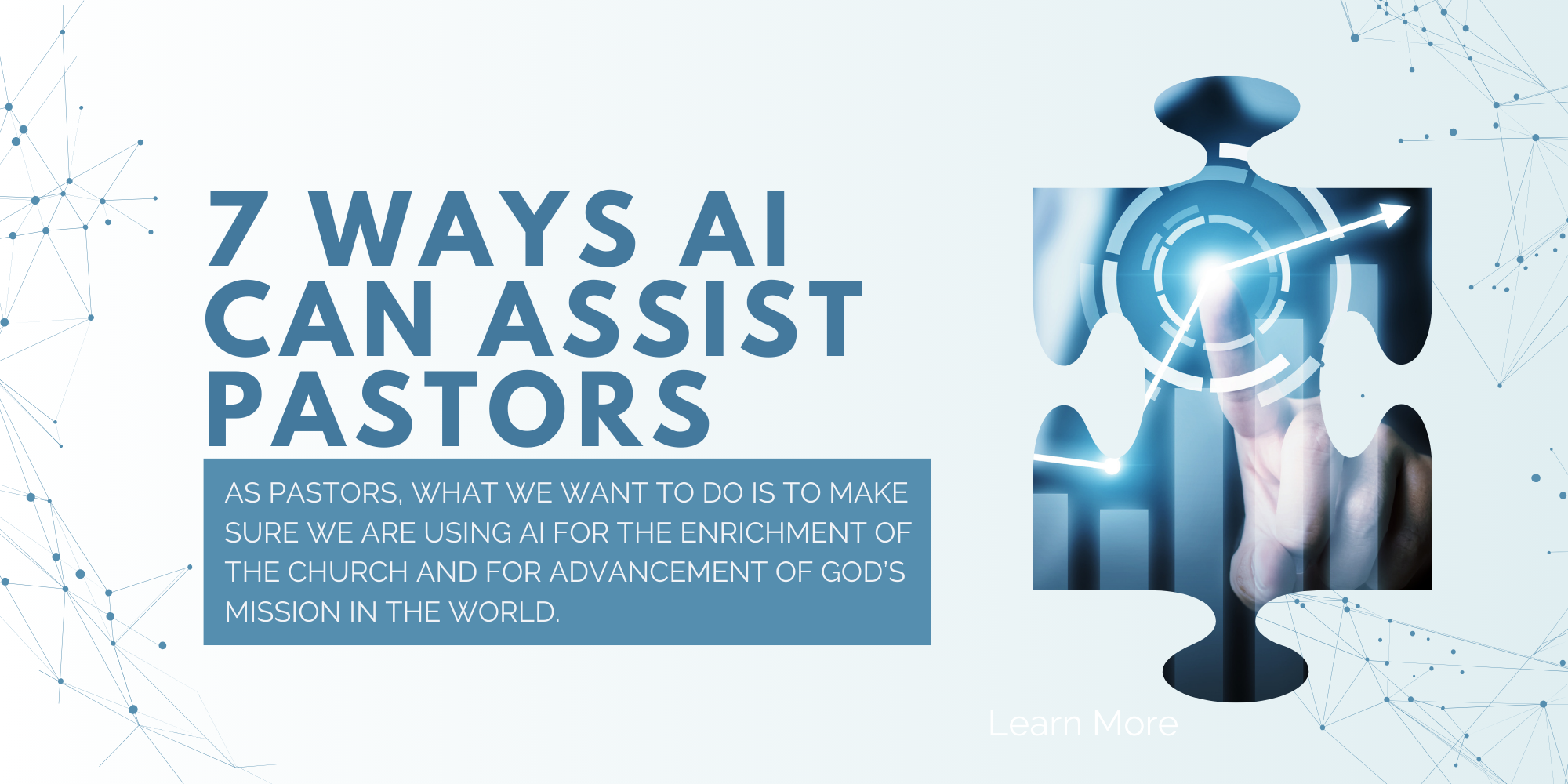A recent discussion with young professionals in our community turned to artificial intelligence, and I was asked, “What do you think of AI, and how are you using it in your work as a pastor?” I had not given much thought to how pastors can benefit from the resources of AI, so I decided to explore that question more intentionally.
A global leader in AI, Andrew Ng, insists, “It is difficult to think of a major industry that AI will not transform. This includes healthcare, education, transportation, retail, communications, and agriculture. There are surprisingly clear paths for AI to make a significant difference in these industries.”
AI is becoming an integral part of today’s world, transforming various industries and revolutionizing how we live and work. While AI is often associated with technological advancements in business and healthcare, AI has also started to make its mark in religious communities, offering new possibilities and opportunities for pastors to enhance their ministry. Primarily, I am interested in exploring how AI can assist pastors and contribute to their vital role in guiding and supporting their congregations.
Here are 7 ways AI pastors may utilize AI to enrich their ministry:
- Sermon Preparation: Crafting inspiring and relevant sermons that resonate with the congregation’s needs and interests is one of the most crucial aspects of pastoral ministry. AI-powered tools can aid pastors in researching and organizing relevant content, scriptures, and historical context. With the assistance of AI, pastors can access vast databases, theological texts, and commentaries to enhance their biblical knowledge and ensure reliable interpretations. AI can even help generate sermon outlines based on chosen themes or biblical passages, providing valuable insights and fresh perspectives. AI shouldn’t prepare the sermon for you, but it can be useful when used appropriately.
- Writing and Editing: Besides sermon preparation, most pastors write newsletter articles, blog columns, devotionals, reference letters, emails, and social media posts. AI can assist in generating ideas, doing research on specific topics, providing templates for correspondence, finding relevant illustrations, and proofreading your work. When using AI to generate ideas and assist with proofreading, no citation or attribution is necessary. However, when using AI to generate the bulk of your content, a citation is appropriate. The MLA Handbook now includes a way to cite an AI-generated source. When using AI to contribute to content in one of my columns, I include an endnote that says, “This article has been written with the assistance of AI.”
- Pastoral Care and Counseling: AI has the potential to enhance the provision of pastoral care and support services significantly. Virtual assistants, driven by AI algorithms, can quickly locate and generate resources to assist the pastor in ministering to those seeking spiritual guidance or counseling. Such resources may include scriptural references, prayers, counseling services, healthcare referrals, and grief support. These resources can be made accessible even when the minister is not available.
- Community Engagement and Outreach: AI can be crucial in connecting pastors with their congregations and facilitating community engagement. Social media monitoring tools can help pastors understand the concerns, interests, and questions of their community members, enabling them to tailor their messages and programs to address these needs effectively.
- Data Analytics for Decision-Making: AI’s ability to process and analyze vast amounts of data can assist pastors in making informed decisions and strategic planning. By examining demographic information, attendance records, and engagement metrics, pastors can gain insights into the needs and preferences of their congregations. This data-driven approach allows pastors to adapt their ministry, identify areas that require attention, and implement strategies that align with their community’s evolving dynamics.
- Language Translation and Interpretation: In an increasingly multicultural world, pastors often face the challenge of delivering messages to congregants with different language backgrounds. AI-powered language translation tools can assist pastors in presenting their sermons, written or oral, in multiple languages. These translation tools can also help pastors communicate effectively with non-English-speaking individuals during counseling sessions or hospital visits, ensuring that no one is deprived of pastoral care due to language limitations. For example, I am currently providing a printed translation of my sermons each week for a family our church is hosting from Ukraine.
- Administrative assistance: Employing AI to accomplish routine administrative tasks can free up a pastor’s time to focus on more meaningful interactions and activities within their communities. In some churches, whether due to budget cuts or personnel realignment, administrative support has shifted from administrative staff members to the minister. A virtual assistant can enable a pastor to minimize administrative tasks and be prominent in ministry initiatives.
As with any technology, including the internet, smart devices, and social media, AI has positive and negative potential, according to how the resource is used. AI offers the capacity to increase the effectiveness of pastors as spiritual leaders and caregivers. By harnessing the power of AI, pastors can enhance their sermon preparation, improve their writing skills, provide personalized pastoral care, engage with their communities effectively, make data-driven decisions, and overcome language barriers. It is essential for pastors and religious leaders to embrace technology responsibly and integrate AI tools thoughtfully into their ministries, ensuring that human connection, spiritual insight, and relational empathy remain at the core of their pastoral work.
Tim Cook, CEO of Apple, cautions, “What all of us have to do is to make sure we are using AI in a way that is for the benefit of humanity, not to the detriment of humanity.”
As pastors, what we want to do is to make sure we are using AI for the enrichment of the church and for advancement of God’s mission in the world.

Enlightening, thank you.